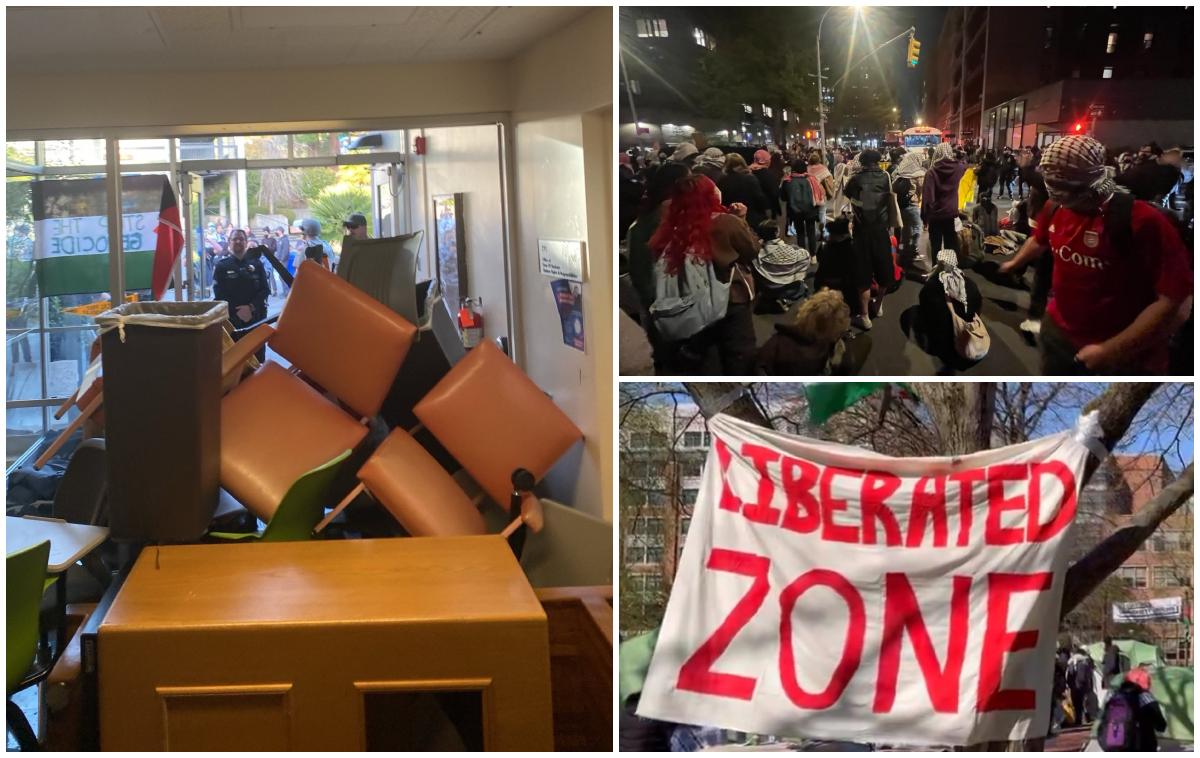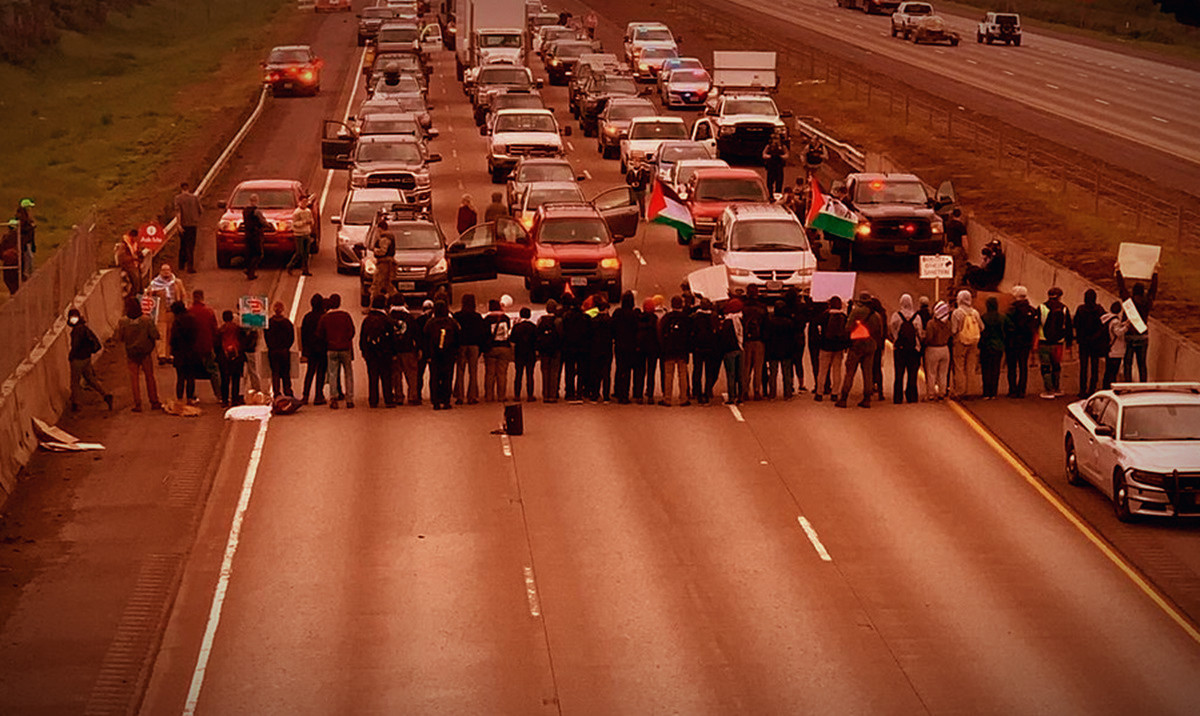
Introduction
“I might compare myself to a person who, on beholding beautiful animals either created by the painter’s art, or, better still, alive but at rest, is seized with a desire to see them in motion or engaged in some struggle or conflict to which their forms appear suited.” -Plato
On November 15th, 2015, two police officers approached a young black man in the Northside neighborhood of Minneapolis, Minnesota. Accounts differ as to what occurred next, but by the end of the night, 24-year-old Jamar Clarke would die in his hospital bed from a bullet wound in his head. On the very next day, the police precinct nearest to the shooting was swarming with people. Neighbors, police, activists and others looking for answers, or trouble. Some came to sing, some to pray, some to scream, some to talk, some to throw stones, some to disrupt, and others to manage. Months after the camp had disbanded, on March 30th, 2016, Hennepin County Attorney Mike Freeman announced that no charges would be brought against the Minneapolis police officers responsible for the death of Jamar. That same day, a group marched to a rally at sundown at the downtown government center. Speeches were given, cameras flashed, and bodies massed inside the blockade the police had set up. Towards the end, a man in a white t-shirt stepped up to the mic, waited stoically for the chanting to end, and started his speech by declaring a simple fact: “This is civil warfare.”
We all know civil war. We talk about it all the time. We learn about it in school. America had one once. Spain, too, in the glory days. Greece, Italy, Germany. What civilized country hasn’t had a civil war? Our journalists and presidents never stop telling us about the civil war tearing the world apart: global terrorism and disorder, especially in the Middle East. We hear all about civil war when it happens over there in Iraq or in Syria: mass executions in public squares, tanks in the city streets, rebels speaking to cameras. We know these images, too. Some say civil war rages in the streets of Cairo, of Athens, or Paris. Certain images come to mind, depending on where you stand: students occupying their schools, refugees marching through the streets, a general strike being declared. That’s all commonplace now.
We all know civil war, whether it frightens or inspires. It would be easy to paint pictures of either horrors or heroics, to tell the history of civil war as the history of vengeance and genocide or to tell it as a history of aborted missions and failed revolutions. Surely, many have already done so. Our task will be more difficult. We want to show how civil war is happening in the city, in our cities, even right here in the Twin Cities, even when we speak of peace, community, and stability. Nothing seems more unlikely. We know how bold a proposition it is to talk of civil war, the most unstable of wars (what definition can contain everything that’s been called “civil war”?) in the flat country between the coasts. Our task is to demonstrate that civil war is not a marginal event, an aberrant or special occurrence, but rather that it exists in the very heart of the most overlooked institutions of the West. We will show how civil war and the strategies developed to deal with it are not exclusive to the outbreak of extreme violence, but appear in the everyday experiences of people in the city.
We will begin with a very peculiar event in the annals of history, one that seems farther from the present than ever: the civil war between a group of oligarchs and the democrats in 5th century ancient Greece. We begin with the Greeks because we believe that those who skip them and start with the “modern” political history accept as truth many things that for the Greeks were partisan positions of war. The ancient Greeks were great experimenters. We are still amazed by their novelty and ingenuity. They fashioned democracy, philosophy, grammar, history, and science out of a loose assortment of shared knowledge and practices from the Mediterranean and Near East. On the other hand, we accept much of what they considered experiment as fact, thanks to certain politicians, philosophers, grammar teachers, historians, and scientists. If we spend a lot of time talking about the old Greeks, it’s because we see the same arguments, the same problems, and the same strategies for dealing with them persist into today, even in our remote Midwestern towns. If one wants to reopen the door to experimentation, one must weaken the foundations at the point at which experiment became truth, one must be willing to dispense with comforting facts. Our plan is to trace the way some people have talked about civil war and some of the ways they’ve tried to control it from that particular moment in Greece through its transition into the Roman world, into the American Revolution and the founding of this country, and finally into our homey and more comfortable Midwestern war zone.
We noticed something early on in our research on civil war: the term seemed to prevent every effort we made to conceptualize it, to hone in and finally define it. To say “we are fighting a civil war” is not to say, at least not in itself, “we are the revolutionaries (or reformers) with a plan,” nor is it to say “we are building a movement here” as one is accustomed to hearing at such rallies. The idea of civil war is much more ambivalent and ambiguous. We found that civil war is at war with itself. It is not purely a legal term, not purely military, not purely political, not purely subjective, and it resists all quantitative definition. The term is used by some when they want to push something —some unfathomable or discomforting thing— as far away as possible, and by others when they want those same events to be brought crashing down like a meteor into the present. The first people to create and conceive of something they called civil war began to see it everywhere. They said: “civil war is permanent and it is everywhere. It threatens the stability of my city, my home, my life.” Why? Because any old conflict could potentially become strong enough to threaten those bonds considered eternal or unbreakable. A son who becomes a democrat and who decides to take arms against the party his family holds allegiance to, the oligarchs, will be involved in a civil war. He threatens the bond of the family and of the city, and he brings about their breakdown even if he loses his fight. Picking up arms wasn’t even necessary to cause that breakdown. A particularly convincing argument that attracted people to its side was also considered an act of civil war insofar as it threatened the stability of the community by tearing it in half.
Many will think of only the most bloody atrocities when we use the term. This immediate identification of the word with the terrible events in the Congo or in Syria is the product of a strategy to bury what is most threatening about it, or even to hide the declarer’s own interest in the conflict. “We have nothing to do with that,” the Western powers can say, for example, about the Congo, because “that’s a civil war.” Similarly, ask yourself how in this country some can claim to live in perpetual peace and others in perpetual conflict with the same group of people? From Tupac (“Instead of war on poverty/ They got a war on drugs so police can bother me”) in California in the 90s to Vic Mensa (“Ready for the war, we got our boots strapped/ hundred people State Street, where the troops at?”) in Chicago today, rappers have more persistently attested to a war between the police and black youth; a war which is absent from the imaginary of most other popular musical genres, and which many actively deny; a war in which the battlefield, the belligerents, and even the scope, cause, and framework are contentious facts. Sekou Odinga, a member of the Black Liberation Army, once remarked that “People always ask why I did what I did, and I tell them I was a soldier in a war. And they always say, ‘What war?’” Such a war can only be called a civil war.

The same people who would first conceive of civil war as a separate phenomenon, the ancient Greeks, would be the first to attempt to banish it from the city, and to say that they’d resolved it. But they never stopped talking about it, seeing it in their families, their courts, the battlefield, in short, every place that relied on the idea that certain bonds held together despite conflict. The family will outlive its strife because it is based on a deeper bond in the truth of blood; the law will prevail because it is objective and eternal and was founded in the inaccessible ancient past; the army will stay unified because this war is just and the soldiers are like brothers. What of the times when they don’t hold together? The West has since then talked incessantly of civil war, because these very bonds were in reality quite precarious, and they rarely held together.
Civil war has retained its characteristic ambiguity and contentiousness, so that each time one is declared, some will arise to claim that it doesn’t exist, others will say it is limited to a certain area, and still others will say it is raging everywhere but disagree about who the actors are and how the war manifests itself. In a civil war, even denial is an act of war for delegitimizing the enemy. For this reason, civil war will be the most dangerous possible thought for those most concerned with the idea of unity. Is it surprising that those who would like to banish any mention of civil war talk constantly of the “disease” or of the “infection” threatening their city and households, thus attributing their misfortunes to some horror of fate?
What were the Greeks so afraid of? What were the American revolutionaries afraid of? The city planners? The police? Difference between people. The tie between the two — civil war and difference — is so strong we are tempted to make an equivalency out of them, to say civil war equals difference. We won’t go so far, not yet at least, but we will say that there is a paradox internal to every way of speaking and acting collectively which claims to unify a large group of people. The most basic form of the paradox is: the more a certain way of speaking or acting claims to represent a large group of people, the more it tends to break down and divide internally. The West has been fighting a losing war against difference. It has tried to contain it, to stifle it, murder it, and finally manage it but it has always failed. Our project is to think difference rigorously, and to not stop even when politeness or sanctity demands us to. This means we will have to avoid thinking difference as an essential attribute. To think difference also means questioning some of the most basic assumptions about our shared history as a city, as a country, as a political tradition based on consensus. To think about difference is to affirm it even when it is unpopular, when it’s called violent or disgusting, when it’s shamed or exiled. A history of difference requires a lot of uncovering. We seek the exiles of our history. We want to let them speak.
So let’s be clear from the very beginning about how we plan to get there. We endeavor to discover gaps, however small, in those things most taken for granted and consider some crises in everyday life. We don’t have to look far or uncover any deep secrets. The crisis is said all the time in the most banal of ways. The crisis is what is constantly said, but in ways that evade facing it. A crisis first denoted the moment at which a doctor must decide how to act in a life or death situation. A crisis is that which is unexplainable according to any known criterion. It does not present a clear answer or route. It brings forth its own distinctions, and disturbs the old ones. This is why, through the root, it is also related to the English word riddle. It is the the unsurpassable, at which juncture one must make a choice. Locating a crisis in thought and action opens up a new potential precisely where structures and narratives seem most static. To locate and describe a crisis is to find the threshold at which a concept admits of its opposite, falters, and fluctuates into indeterminacy. Speaking of crisis in the context of civil war makes sense, for civil war has, since its uncertain beginnings, been compared to a life-threatening disease.
How will we respond to the crisis of civil war? What will we make of the fact that difference exists? Difference has the power to dispel illusion and open up pathways where we previously thought there to be only one or two, but we must not run away from what is complicated and difficult about it. There will be confrontations. When we accept this fact of difference, we can begin in earnest. For those who deny and doubt difference, and yet never cease to talk about it, it will remain a Pandora’s box of horror. We assert against that grain that it can equally be a fount of joy. Our difference from others is, for us, the possibility of friendship.
The following can be read as part of a humble attempt to locate one crisis at the point at which the political becomes solely the administration of civil war in 5th century Attic Greece. We write this in the wake of some recent experiences in Minneapolis in the hopes that these crises may prove decisive in the Midwest and elsewhere, distant though they may seem.
Glossary of terms
Arche: A complex term to describe the political founding of the city, and preferred by the democrats to kratos because of its intransibility. It’s at the root of “archeology,” literally “the study of beginnings;” “architecture,” literally “the beginning and rule of the technical;” “arch,” as in “arch-enemy,” meaning original and most serious enemy. An arche is not a simple chronological point, as if we could say: “after the Peloponnesian War…” or “after the colonization of Ionia… then Western politics really began.” Rather, the arche is the foundation or the ground, which is the justification and the articulation of those powers. The arche is that to which all activity must be referred back to in order to appear as “activity” at all.
Becoming (Physis): The difficulty in understanding becoming-without-end arises from the confusion and conflation of the sense of two entirely different ways of saying something is: one stems from the Indo-European bheu—, from which English derives being; Latin fieri, to become or take place; Germanic būaną, to dwell; and the Greek phusis, which, as we’ve said, means becoming, presence or growth. The other Indo-European root es— has an entirely different set of meanings. From it, we have the root for our words is, yes, and sin. It was a judicial word in ancient Hittite, where it meant “yes, that account of my actions is true, hence I am guilty.” To say “it is…” and to fix that position as the essence or the end of the thing is a species of accounting. Bheu— indicates a constellation of unfoldings within a context that is inseparable from the passage of the experience at hand. To make a solid distinction, we’d say that bheu— and its derivatives denote disposition (Latin: dispositio, to put things in an order, arrange) while es— and its derivatives denote identity. Even phonetically, with the first set you leave your mouth open and let the sounds settle on the wind; the second has you ensnare the air like a trap behind your teeth.
Demokratia: The kratos (see Kratos) of the demos, the people, consistently misunderstood as “population” or “humanity.” Specifically refers to a “part” of “all the people” for which mass the Greeks had no name. Demos stems from Indo-European root *deh—, which means “to divide.” Could also refer to a faction in the circus or a township. Demos-kratia, democracy, means domination of some people over others.
Dispositio: Although one could translate dispositio as apparatus, device, or operation, we choose to keep the term in Latin due to its clear lexical connection with disposition. Michel Foucault defined the dispositio (dispositif in French) as “a thoroughly heterogeneous ensemble consisting of discourses, institutions, architectural forms, regulatory decisions, laws, administrative measures, scientific statements, philosophical, moral and philanthropic propositions–in short, the said as much as the unsaid. Such are the elements of the dispositif [dispositio]. The dispositif [dispositio] itself is the system of relations that can be established between these elements.”
Kratos: Power in the sense of “power over” or authority. Kratos implies domination, superiority, and control.
Mania: Spirits or demons of fury and frenzy that posses and make “mad.” Mania does not exist inside of humans but travels through them and possesses them.
Oikonomia: A form of organization of people and things that differs from political organization in that it concerns itself with managing things with an eye towards the end result. It evolved in tandem with the democratic style of doing politics, which distinguishes between legitimate political beings with illegitimate ones by how well they manage inferiors in their household. This is the form of government at the heart of the ancient household, the feudal manor, the monastery, the military academy, the Puritan household, and finally the police. In a parallel evolution to the one traced above, the idea of oikonomia (household governance) was the tool used by the early church to consolidate of Christian sects in the infancy of the religion. The early Christian theorists of the Trinity who were working to prevent fractures or alternative interpretations of the new fragile Christian power had to introduce a concept that would focus on what God and the Trinity can do and not how they justify their powers. The Trinity (God, the Son, and the Holy Ghost) presents some very basic problems when God is conceived as a political ruler. The early Christians were fully aware of the danger of civil war plaguing every political foundation. If there was to be absolute rule from God, he must stand both inside and outside the political sphere he rules, which would introduce a stasis at the very beginning. A question as simple as “why is God one and three if He is the ultimate authority?” was very troubling to the early Christians. Positing God as both inside and outside, as both before and underlying, the created world fractures Him, and introduces an imperfection, which is impossible, and opens the door to all brands of mystical and magical heresies. Oikonomia, or economic rationality, was thought to prevent such a fracture in God by replacing the political possibility of division with the “economic” demands of administration. In this way the theologians could avoid the embarrassing questions about God’s ultimate authority, about God being both one and three, about the gap between being and nothingness, about God before the creation of the world by simply reinscribing them into a system of mutual legitimation in the “economic” management of the Trinity. Every religion, insofar as it is open to interpretation, carries this “political” possibility that one or a group of people will claim to derive legitimacy from a different part of a canonical text or mystical experience and thus political difference from another grouping. If this division can be displaced into “economic” concerns about governing our manner and behavior, then the threat of dissolution can be averted. To distinguish our concept from the ideas usually associated with “economic,” we will tend to use “domestic” in our text to describe this power, from the Latin domus, household, and the root for the word dominate.
Nomos: Nomos is a Greek term that comes from the Indo-European nem—, which means to enclose, to divide, to pasture, and to appropriate. Usually translated as “law,” we have made the argument that it is closer to “norm.” It is related to the German nehmen, to take; the Latin numerus, number or division; as well as nomad, wandering in search of pasture. Norm comes from Latin norma, where it materially refers to the carpenter’s square. A norm is thus a tool for straightening, for making something adhere to the rule. Something is normal when it adheres to the norm. Thus measuring a stick in inches is normal because it adheres to the norms of measurement that have been established. Something is normative when its existence or use establishes new norms and sets them in place. New technologies that impose new norms on existence in practice, like the cell phone, for example, are normative. The normal is the effect that arises from a normative project. The project of normalizing requires setting the normal in polemical opposition to the abnormal, which it modifies by definition. But such a modification is the very project of normalization itself, and thus, paradoxically, the abnormal is existentially first, but logically second. It is sensed, and a project is brought about to correct it. One cannot say that the normal existed and then at some point the abnormal arose from out of it. Rather, normalization only begins —and thus also the relation to what is considered normal at all— after a phenomenon is perceived to be abnormal. In the “silence of the organs,” the normal is not perceived because it is all-encompassing. One must perceive a difference to then look inward at what is “normal.”
Polemos: War conceived as the battle between two forces. There is no “war in general” for the ancient world. Polemos was the acceptable form of war directed toward the outsider (barbarian, savage, etc). It seems Plato was so intent on avoiding granting stasis its own independent meaning that he paradoxically uses polemos, which refers specifically to war against outsiders, to describe it. To call stasis “emphylios polemos” would be to say that every conflict is one of exteriority, and involves first considering the enemy to be essentially other in some way before the beginning of a conflict. It is essential that we maintain, against Plato, the ambiguous connection to the oikos, the home, or the domestic realm, which is implied in the word “emphylios,” an adjective meaning “of the same (people, race, land).” Stasis, as Plato himself will say elsewhere, is war between the different oikoi, or households, whereas polemos is war against the othneios, the outsider, but also, ambiguously, the relative.
Stasis: The basic principle of all collective engagement in the West. It is unimportant to us whether or not stasis evolved directly into the Roman concept of civil war, or into the modern one. It is not a “thing,” nor an “idea,” for the ending “—sis” is attached to nouns denoting activities. Such nouns do not imply a subject. One does not say “he or she is instigating stasis” but rather “stasis is happening.” English receives the words static and status-quo from the Latin translation stare, to rest, which centered in on the immobile sense of the word. Every group that attempts to posit a neutral center also produces a stasis. Unlike most modern concepts of civil war, “[s]tasis did not necessarily involve violence, but in some cases it was a threat or situation and state of mind of the citizens where the recourse to violence was potentially imminent.” (Mosche Berent) “Disorder,” for instance, threatens modern political organizations in a similar way, but is conceived to be a different problem. Yet the principle is basically the same. If the “disorders” overpowered the ability of a managerial power to manage them and “order” collapsed, they would cease to be “disorders.” New orders would become possible. This is just one example of a term that functions in a similar way, but that, over time, was dissociated from what “civil war” signified. Despite its typical association with violence, though, civil war, like stasis, has never achieved a definition that all parties would agree on. Today it is regularly used to describe the violent disorders in Syria, and also the chaos in the Republican Party following the election of Trump.





